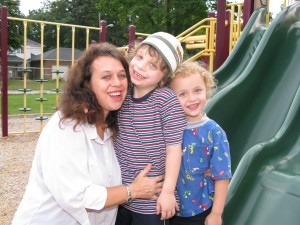1. Don’t assume that my child has low intelligence. Kids with autism are often capable of more than we give them credit for. Many of them have varying degrees of communication delays, which is why people don’t always realize the extent of their intelligence. As a result, they are often excluded from games and activities, when they should at least be given the option of participating.
2. Don’t assume that my child is a genius. When I tell people that my son is autistic, they immediately assume that he’s like Rain Man. Autistic savants do exist, but they are extremely rare. My son does have his strengths, and some of them could well turn out to be career material. But he’s unlikely to be the next Einstein, and people should not expect him to have some savant-like party-trick up his sleeve.
3. Don’t assume that my child doesn’t understand anything you say. Speech development in kids is divided roughly into two categories: expressive language (what a child says, or expresses) and receptive language (what a child understands, or receives). For many kids with autism, receptive language far outpaces expressive language, meaning a child who is non-verbal can understand and process a lot of what is said to him or her. It drives me crazy when people say things like, “Would your son like some juice?” when he is standing right beside me. Ask him if he’d like some juice. There’s a decent chance that he’ll answer, and the best way for him to develop his language skills is by practicing them.
4. Don’t assume that my child understands everything you say. Autism is an invisible disability. Apart from a very slight awkwardness in his gait, my son looks just like any other kid his age. You cannot tell just by looking at him that he has a disability. Therefore, one could be forgiven for assuming that he has the same language capabilities as other kids. If my son hesitates to answer you or act on what you’re saying, try breaking down your sentence into smaller, simpler chunks.
5. Don’t assume that my child “needs discipline”. Yes, I have on many occasions been “that mom”. You know, the one everyone is staring at because of her child melting down in the grocery store or making loud vocalizations in a restaurant. Most people, to their credit, are very understanding once they know that autism is in the picture, but there are always those who insist that a swift smack on the behind is all that is needed. I once had an elderly woman telling me, “In my day, no child was autistic because we were raised with discipline.” Here’s the truth: a meltdown can be awkward and uncomfortable for the parents and any onlookers, but it is a thousand times worse for the overwhelmed, anxiety-ridden child who is experiencing it.
6. Don’t assume that my child isn’t capable of misbehaviour. My son is twelve, and he has a twelve-year-old’s attitude. He is going through the same moodiness and unpredictability that other pubescent kids go through. It is easy to use autism as the default explanation for his behaviour, but as a doctor told me many years ago, “He is a boy with autism, but he is first and foremost a boy.” I have become quite adept at distinguishing my son’s “autistic” behaviour from his “typical bratty kid” behaviour, and I react accordingly.
7. Don’t assume that my child is incapable of emotion. Because he really isn’t. One of the biggest misconceptions surrounding autism is that autistics do not have the capacity for love and empathy. My son is one of sweetest, most loving people I have ever come across. He is full of hugs for the people he loves, and making people happy brings him joy. Here’s something he has done since he was little: when he wakes up in the middle of the night, he gets up to check on his younger brother and make sure he’s covered with a blanket.
8. Don’t assume that my child knows how to react to emotion. My son is undoubtedly an emotional being, but he does not always know how to respond to the emotions of others. And when he doesn’t know how to respond, his default reaction is hysterical laughter. This understandably appears to be incredibly insensitive to someone who is crying, but it’s a simple case of my son not knowing how to process something. He knows that crying is associated with sadness – he simply doesn’t know what to do with that.
9. Don’t assume that my child is not a social being. It is true that at times, social gatherings make my son uncomfortable. His tolerance for noise and crowds is definitely lower than that of most people, and for that reason we always choose to have events like Christmas and birthday parties at home. That way, he can retreat when he needs to. But in general, my son likes people. He likes being around them and interacting with them in his own way.
10. Don’t assume that my child is socially aware. To my knowledge, my son has never been around anyone who would deliberately want to do him harm. At his school, the general student body is tremendously respectful and protective toward the special needs kids. I have never had to worry about bullying or discrimination, but I know that this may not always be the case. My son is very trusting, as many people with autism are. He has limited sense of danger, as many people with autism do. He does not really have the capacity to understand that people can act nice but have not-so-nice motives.
This is an original post for Running for Autism by Kirsten Doyle.











